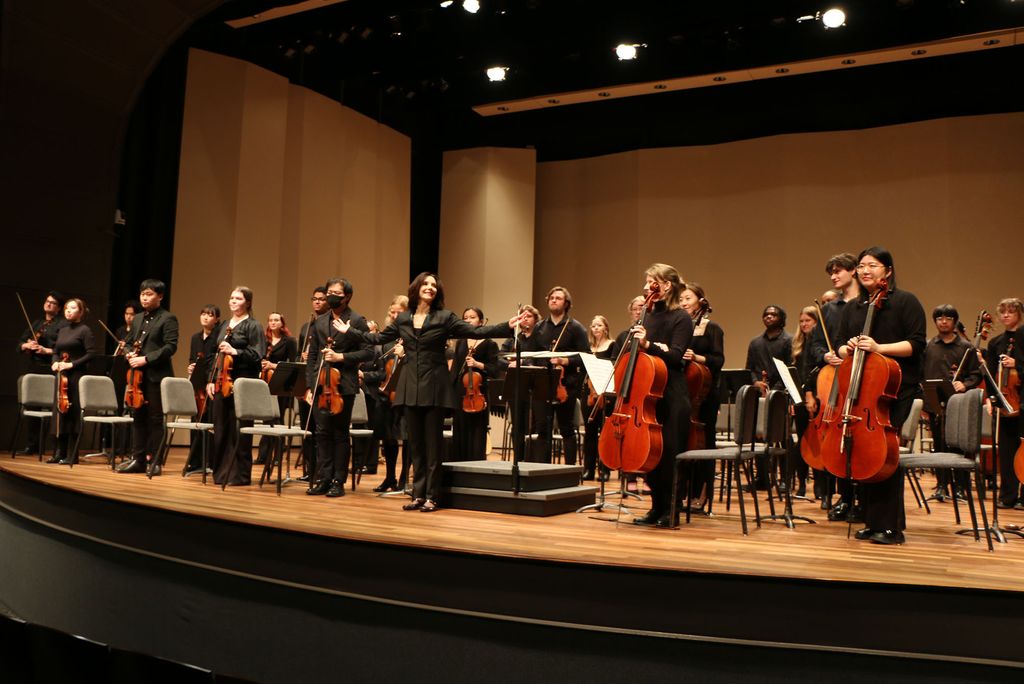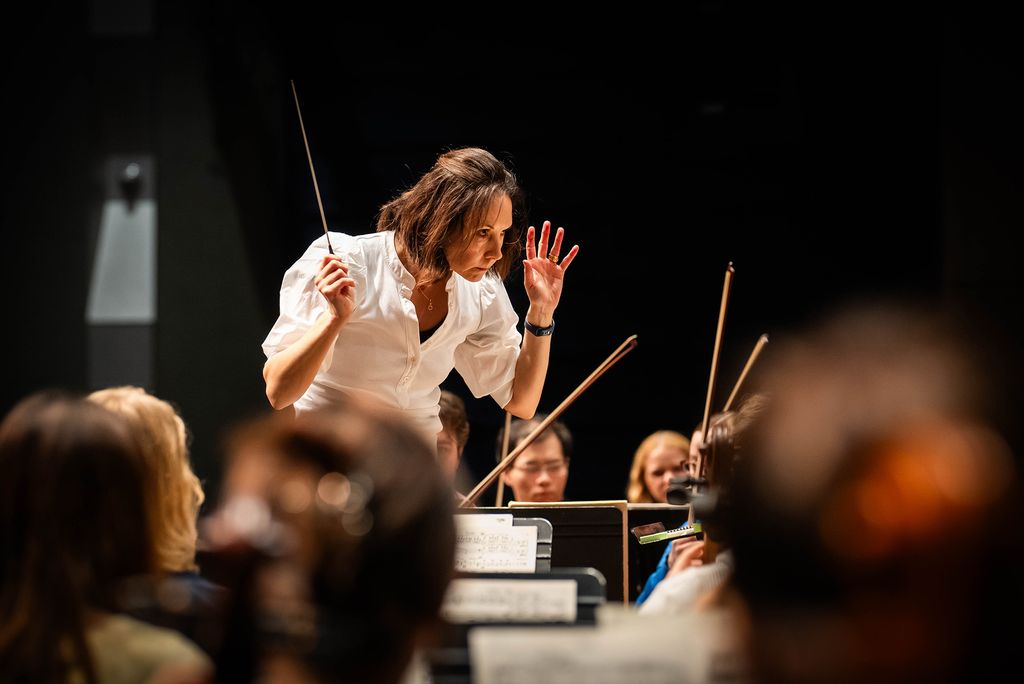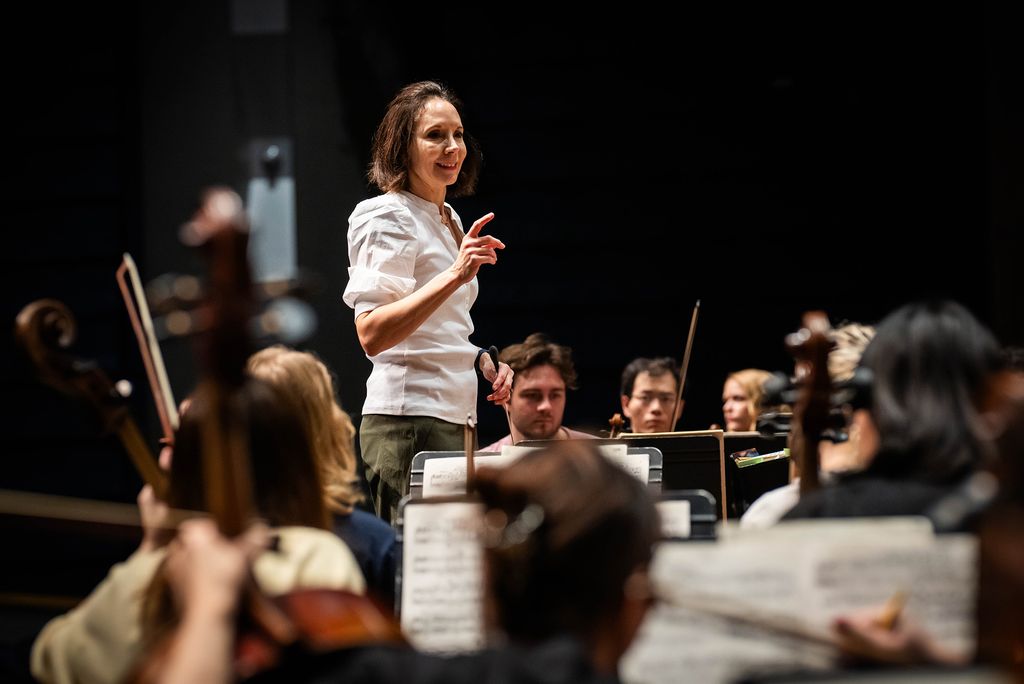Baton in Hand, BU’s Sarah Ioannides Inspires a New Generation of Musicians
Conductor is renowned for collaboration, innovation, and championing new music
Baton in Hand, BU’s Sarah Ioannides Inspires a New Generation of Musicians
Baton in Hand, BU’s Sarah Ioannides Inspires a New Generation of Musicians
It’s not an exaggeration to say that Sarah Ioannides was destined to become a conductor. She comes from a long line (eight generations) of musicians and composers, dating back to 1750. Her father is a conductor and composer and her mother was an accomplished singer and flutist.
“Before I can remember, music was part of me,” says Ioannides, who arrived at BU in September 2024 as the College of Fine Arts director of orchestral activities and an associate professor in orchestral conducting. “My father was conducting opera and the Canberra [Australia] Choral Society when I was in my mother’s womb. My mother sang in the choir. I was born listening to music. And as a child, I was more interested in sitting in front of the record player than playing outside with other kids. I had this very curious mind and attraction to musical sound right from the beginning.”
Ioannides, who was born in Australia and earned degrees at Oxford University and the Juilliard School, has won international praise as a conductor. She was the first woman to hold a full-time conducting position with the renowned Cincinnati Symphony Orchestra, and over the course of a career that has taken her to six continents, she has conducted such acclaimed ensembles as the Tonkünstler, the Orchestre Nationale de Lyon, the Royal Philharmonic, and the Seattle Symphony, earning a reputation for innovative programming and superb musicianship. The New York Times, reviewing one of her concerts, cited her “unquestionable strength and authority,” and the Los Angeles Times named her “one of six female conductors breaking the glass podium.”
From Canberra to Oxford to the United States
By the time she was five, Ioannides was playing the piano, and after moving from Canberra, Australia, to England, she took up the recorder, the tenor horn, and then the French horn and violin. By 16, she had won a coveted spot as a violinist with England’s renowned National Youth Orchestra and National Youth Chamber Orchestra.
It wasn’t long before she knew that she wanted to be a conductor. She recalls visiting her father in Germany, where he was conducting operas and choirs. “I would be in heaven for a week or two and then it was back to my normal world of learning instruments, being a school kid, trying to stay out of trouble,” she says. “Very soon I realized that pull to conduct too.”
Her first time on the podium was at age 17 while a student at the Cranleigh School in Surrey, England. She conducted Elgar’s Serenade for Strings.
“I really didn’t know that much about what I was doing at the time,” Ioannides says, but she was drawn to the opportunity to shape the music within an orchestra. When she arrived at Oxford, she began pursuing every opportunity to hone her skills, including private lessons and master classes. By the end of her first year there, she had founded her own orchestra. For their first concert, she selected an ambitious program that included Joseph Haydn’s Lord Nelson Mass, Beethoven’s Symphony No.1, and Leonard Bernstein’s Chichester Psalms.

Determined to learn from her mistakes, she would gather her friends in the orchestra together after rehearsals and ask them for feedback on what was and wasn’t working. She videotaped herself conducting and then pored over the recordings to improve her performance. It paid off. By her second year at Oxford, Ioannides had landed her first big job, as music director of the Oxford Philharmonia.
Breaking the glass podium
When she first told her father of her ambition to become a conductor, he warned her that the job could be very lonely. “He didn’t say it, but I think he recognized that there weren’t very many women conductors out there,” Ioannides says. Her reply: she was certain about her career plans. He came to see her leading the Philharmonia a year later on tour in Manchester, England, and told her after the concert that she’d made the right decision.
“Having his sanction and recognition meant the world to me, so I plunged forward without hesitation and with his support,” she says.
After graduating from Oxford, Ioannides moved to the United States, where she earned a diploma in conducting at the Curtis Institute of Music in Philadelphia on a Fulbright scholarship and went on to get a master’s degree in conducting from Juilliard.
She was winning strong reviews as a guest conductor, but was getting pushback from managers, who would tell her “we don’t represent women” or “women conductors don’t sell.” The perception at the time was that it was too risky to put a woman on the podium.
“There were many occasions of obvious discrimination that felt very wrong and at times it was extremely unpleasant,” Ioannides recalls. Determined to improve opportunities for herself and other female conductors, she got in touch with the president of the League of American Orchestras and told him that women in the field needed more support and that managers were refusing to hire them.
“That was the way I handled it,” she says “I think many women on the podium still do encounter discrimination, but it’s much, much better now.”

After graduating from Juilliard, Ioannides won a position with the renowned Cincinnati Symphony Orchestra, serving as assistant conductor and as music director of the Cincinnati Symphony Youth Orchestra. She then became music director of the El Paso Symphony Orchestra and the Spartanburg Philharmonic Orchestra in South Carolina. And in 2014 she joined Washington State’s Symphony Tacoma as music director. She recently announced that she will step down from that post at the end of the 2025-2026 season.
A commitment to presenting a diverse repertoire
Ioannides has earned a reputation as a champion of new works and those by female composers, who have largely been neglected throughout history. She’s overseen the world premieres of more than 60 pieces, collaborating with composers as varied as Stephen Paulus, David Serkin Ludwig, Victoria Borisova-Ollas, Patrice Rushen, Dario Marianelli, and Tan Dun. Advocating for a more diverse repertoire, she says, is “part of the evolution of our art form…I don’t think we can just stop with what was last on the shelf. I think we have to keep probing, looking, finding, encouraging new voices as our world is changing. We need to have people who are living now write their reflections of humanities.”
Her commitment extends to making the conducting ranks more diverse as well. In 2018, she cofounded the Cascade Conducting Masterclass, which provides training for emerging conductors and composers from around the globe, in partnership with Symphony Tacoma.
She has also earned a reputation for innovation. She has commissioned films and even produced some herself to accompany performances of certain pieces, including one that featured works from the Cincinnati Museum of Art and her own paintings for a performance of Milhaud’s Creation du Monde at Cincinnati’s Summermusik Festival.
Ioannides says joining the BU faculty offered an opportunity to work with accomplished colleagues and students. But it also meant her family could finally be together under one roof after years of hopscotching across the country. Her husband, Scott Hartman, is a trombonist and a professor of music at Yale University. They have three teenagers, who are in school in Tacoma, Wash., with Ioannides and Hartman splitting parenting duties. She estimates that she flies from one coast to the other as often as three times every eight days.
“This will be the first time in our 20-year marriage where we’ve actually worked within driving distance of each other,” Ioannides says. They plan to move their family to a new home in a Boston suburb this spring.



Ioannides conducting her Boston University Symphony Orchestra class March 17, 2025, at the Tsai Performance Center. The orchestra will perform at Symphony Hall on March 31. Photos by Jackie Ricciardi
For Ioannides, the opportunity to lead BU’s orchestral activities and to work with students earning their doctorate degrees in conducting offered another gift: immersing herself fully in the music she loves. “The ability to reach into the art of what I’m doing on a deeper level is why I’m here,” she says. “It’s a chance to really soak in our art form and the repertoire and talk about it with our DMA and master’s conductors. Bringing my understanding and experience to this kind of setting is very enriching.”
As director of orchestral activities, she oversees 160 students who make up the orchestras that accompany the School of Music and Opera Institute as well as the school’s top soloists and composers. It is demanding work for the students, and for Ioannides, who is always looking for opportunities to nurture individual musicians.
What is the most important thing she seeks to impart to her students?
“I think it may be simply about caring,” Ioannides says. “If they see how much I care what we do, what they do, and what a difference it can make, the more likely this will matter to them. You don’t get good at anything if you don’t care. You’ve got to set your sights on something and you’ve got to believe in what you’re doing and understand how it can affect people.”
As for her conducting students, she says she tries to convey her passionate interpretation. “I try to set the music alight with the musicians and steer, as opposed to micromanaging,” she says. “I’m very keen on balance. It can completely ruin a piece if the balance is not right, so I’m very finicky about some things, and that requires us to do a lot of detailed work. There is a huge amount of repertoire, and every piece needs a slightly different style and understanding. The more you understand that composer and their influences, the more you can be an informed interpreter.”
On March 31, Ioannides will be center stage for her most public performance yet at BU—a concert at Symphony Hall. She will conduct the BU Symphony Orchestra in a performance of Richard Strauss’ Suite from Der Ronsekavalier and the Symphony Orchestra and Symphonic Chorus in Maurice Ravel’s Daphnis et Chloé Suite No. 2. The concert, an annual CFA event, will also feature Daniel Parsley, a CFA assistant professor in choral conducting and director of choral activities, conducting the orchestra and Symphonic Chorus in Leonard Bernstein’s Chichester Psalms, and composer and performer Kenneth Amis (CFA’91), a CFA lecturer in tuba, leading the BU Wind Ensemble in Arnold Rosner’s Symphony No. 8, Op. 84, “Trinity.”
What does she hope audiences take away from Monday’s Symphony Hall concert?
“That time you spent here with us and with each other made you think again, feel differently. We experience transcendentalism across cultures and centuries. We may not know how it happens but we know it does—and it matters!”
The Boston University Symphony Orchestra, Wind Ensemble, and Symphonic Chorus will perform their annual spring concert at Symphony Hall on Monday, March 31, at 7:30 pm. Tickets, available through Symphony Hall’s box office, are $10 for general admission; $5 tickets are available for BU students, faculty, and staff with code SOM25.


Comments & Discussion
Boston University moderates comments to facilitate an informed, substantive, civil conversation. Abusive, profane, self-promotional, misleading, incoherent or off-topic comments will be rejected. Moderators are staffed during regular business hours (EST) and can only accept comments written in English. Statistics or facts must include a citation or a link to the citation.